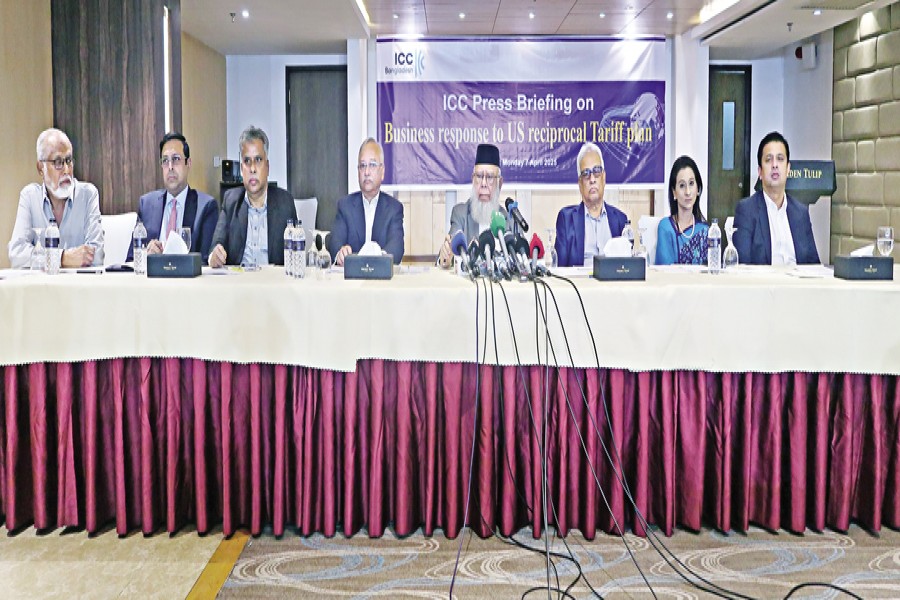
Published :
Updated :

International Chamber of Commerce Bangladesh (ICC Bangladesh) President Mahbubur Rahman has expressed deep concern over the recent announcement of new higher trade tariffs by US President Donald Trump and stressed the importance of undertaking diplomatic negotiations with the US authorities to advocate for more favourable trade terms.
He also proposed the formation of a taskforce under the Ministry of Commerce comprising key stakeholders, including leading exporters and importers, the Export Promotion Bureau (EPB), and customs officials, to monitor bilateral trade trends, address obstacles, and develop remedial measures aimed at narrowing the trade gap with the country.
The prominent business leader shared the recommendations during a press briefing titled "Business Response to U.S. Reciprocal Tariff Plan" and organised by ICC Bangladesh at Golden Tulip Dhaka on Monday.
Abdul Hai Sarker, chairman of Bangladesh Association of Banks (BAB); Kamran T Rahman, president of Metropolitan Chamber of Commerce and Industry, Dhaka (MCCI); Naser Ezaz Bijoy, chief executive officer (CEO) at Standard Chartered Bangladesh; Taskeen Ahmed, president at Dhaka Chamber of Commerce and Industry (DCCI); Fazlul Hoque, former Bangladesh Knitwear Manufacturers and Exporters Association (BKMEA) president; and Simeen Rahman, CEO at Transcom Group; attended the event, among others.
ICC Bangladesh's Mahbubur suggested increasing imports from the US to address the trade imbalance and also strengthening domestic competitiveness to effectively respond to the increased tariffs on exports to the US market.
"It is essential to improve infrastructure, logistics, and port operations. Additionally, enhancing the competitiveness of the readymade garment (RMG) sector through investment in technology, workforce skill development, and adherence to international compliance standards is crucial," he said.
He welcomed the swift response from the government and appreciated Chief Adviser Dr Muhammad Yunus for promptly convening an emergency meeting to assess the impacts of the new US tariffs and formulate an appropriate response strategy.
Mahbubur also appreciated the decision of the government to send letters to the US president from the chief adviser and to the US Trade Representative (USTR) from the commerce adviser.
However, he remarked that sending letters would have limited impacts and emphasised the need for direct diplomatic initiatives at the highest level to resolve the crisis.
"Chief Adviser Dr Muhammad Yunus is expected to engage with the higher US authorities to address trade concerns and maintain favourable market access as he is widely respected in international policy circles," the ICC Bangladesh president said.
He further stated that as America is the world's economic powerhouse, many countries have taken steps to circumvent the tariff plan, with Vietnam already announcing zero tariffs on American products.
Noting that Bangladesh exports $7 billion worth of goods to the US and the government receives only Tk 15.0 billion in revenue from US imports, he said reducing tariffs on American products could be beneficial for the country. He expressed hope that businesses in Bangladesh would be able to overcome the shock and remain competitive under the new tariff regime as the US government imposed higher tariffs on countries that are major competitors of Bangladesh in the US RMG market.
"If countries like China, Vietnam, and Cambodia can continue their business despite tariffs of 54 per cent, 46 per cent, and 49 per cent, respectively, why cannot Bangladesh do so with a relatively lower 37 per cent tariff rate?" he questioned.
This context suggests that while the tariffs are burdensome, Bangladesh's products may still retain some competitive edge over countries facing higher tariffs, said Mahbubur.
The new duty rate will not affect products already at the port or on ships for export, but the RMG sector will face significant financial losses on orders currently being processed in Bangladeshi factories for the next three to four months, as factories are producing about $2 billion worth of clothing for the upcoming season, said former BKMEA president Fazlul.
These products will incur an additional $750 million in duties upon entering the US. Foreign buyers are unlikely to absorb this added cost alone and will likely pressure garment factory owners to offer maximum discounts, which will reduce the profits of Bangladeshi manufacturers, he added.
The full impact of the US administration's counter-tariffs on the Bangladeshi economy is yet to be determined. However, businesses will need to reduce costs and enhance competitiveness through infrastructure and technological advancements to cope with this shock, said BAB Chairman Sarker.
Naser of Standard Chartered Bangladesh said the counter-tariffs will affect the Bangladeshi economy in two phases while exporters' profits will undoubtedly decline as foreign buyers will not absorb the increased tariff burden alone.
In the second phase, the tariffs could lead to a decrease in demand for products in the American market, which may in turn affect the volume of clothing exports, he added.
At the event, the ICC Bangladesh president presented a statement of the International Chamber of Commerce issued by its Secretary General John WH Denton AO. The statement identified the new measures as a shock to the global trading system that need not result in a systemic crisis.
The statement also said today marks a pivotal moment in American trade policy, with US tariff rates reaching levels not seen since the 1930s and covering a larger share of the gross domestic product (GDP) than the Smoot-Hawley Tariff Act, posing significant risks to the global economy.
While the new duties are a shock to global trade, they do not necessarily signal a systemic crisis. The US accounts for just 13 per cent of global imports, and how other nations respond will determine the economic fallout from "Liberation Day," according to the statement.
"We are immediately concerned by the potential impact of the severe tariffs imposed on a range of emerging economies - an approach which risks further damaging the development prospects of countries already facing worsening terms of trade," it added.
jahid.rn@gmail.com


 For all latest news, follow The Financial Express Google News channel.
For all latest news, follow The Financial Express Google News channel.